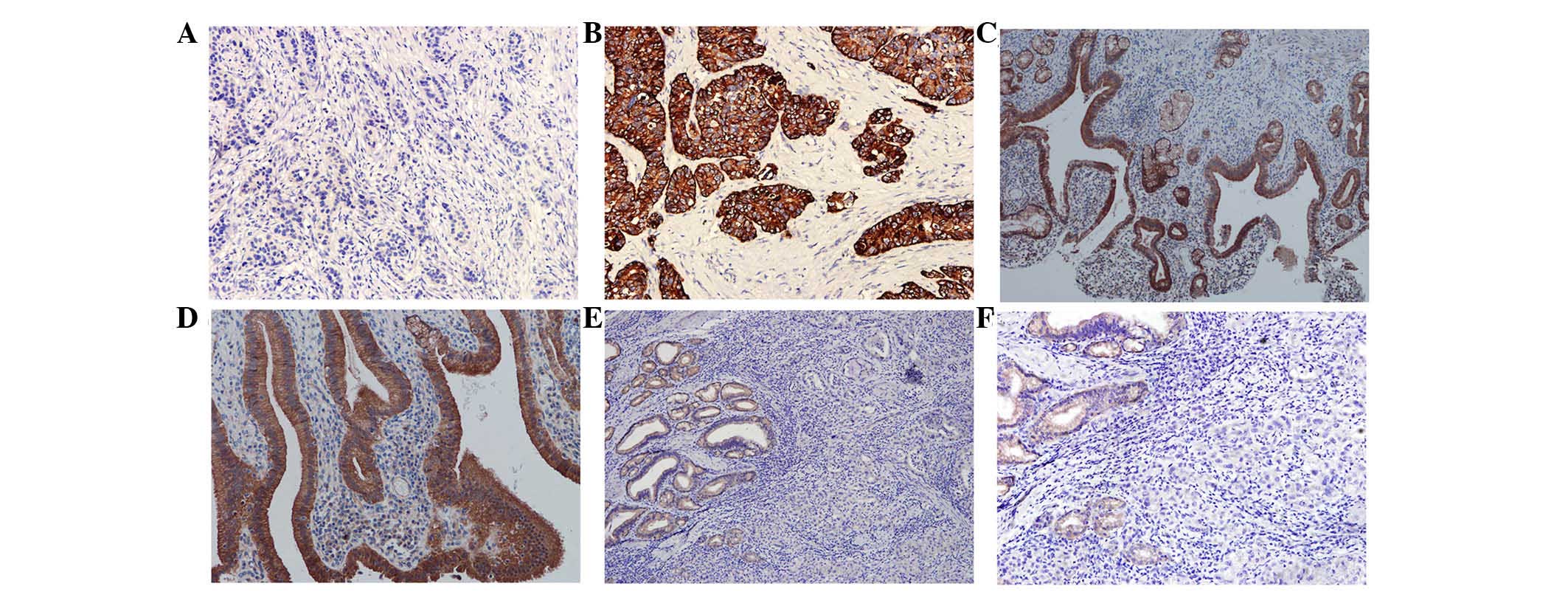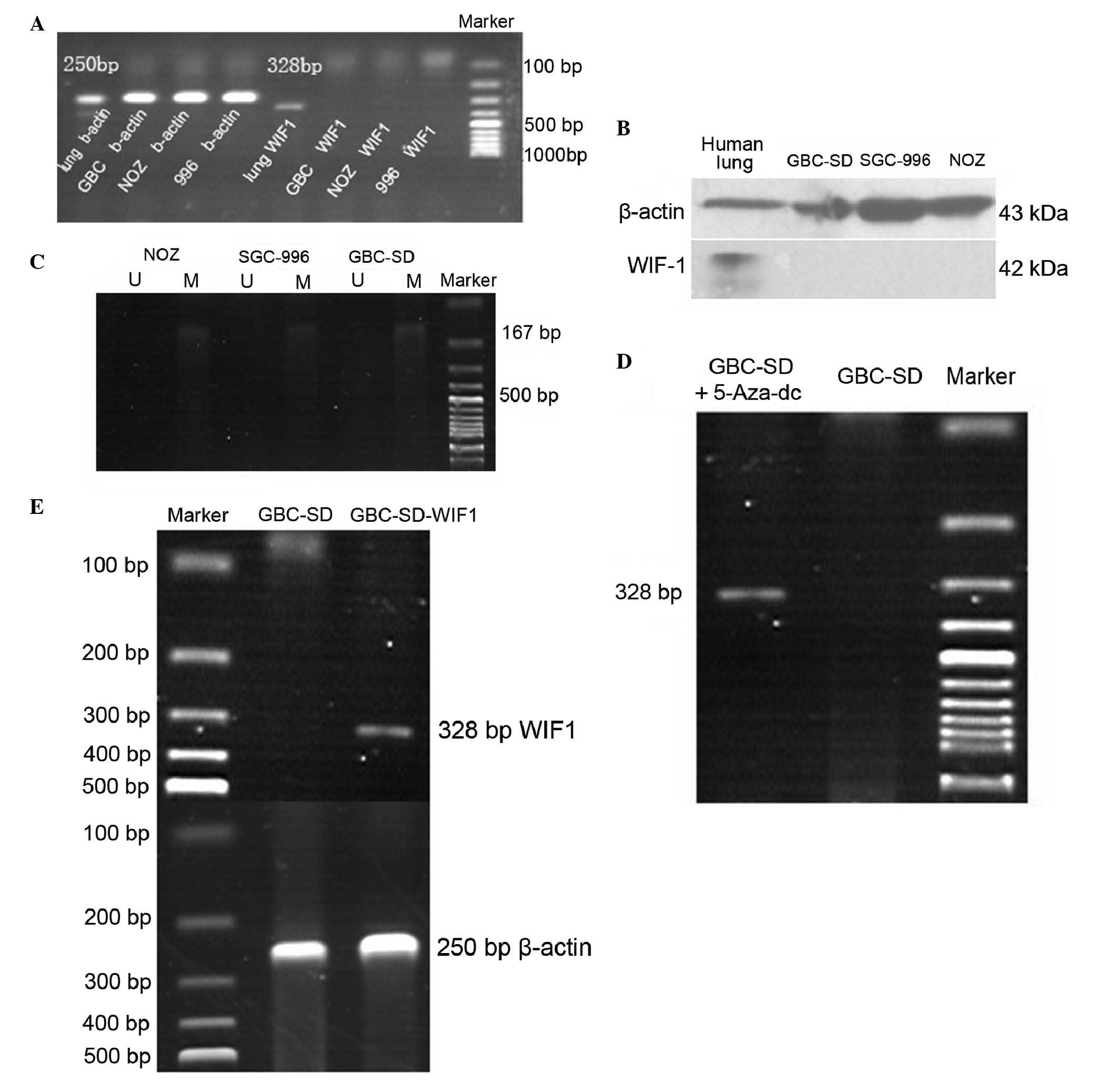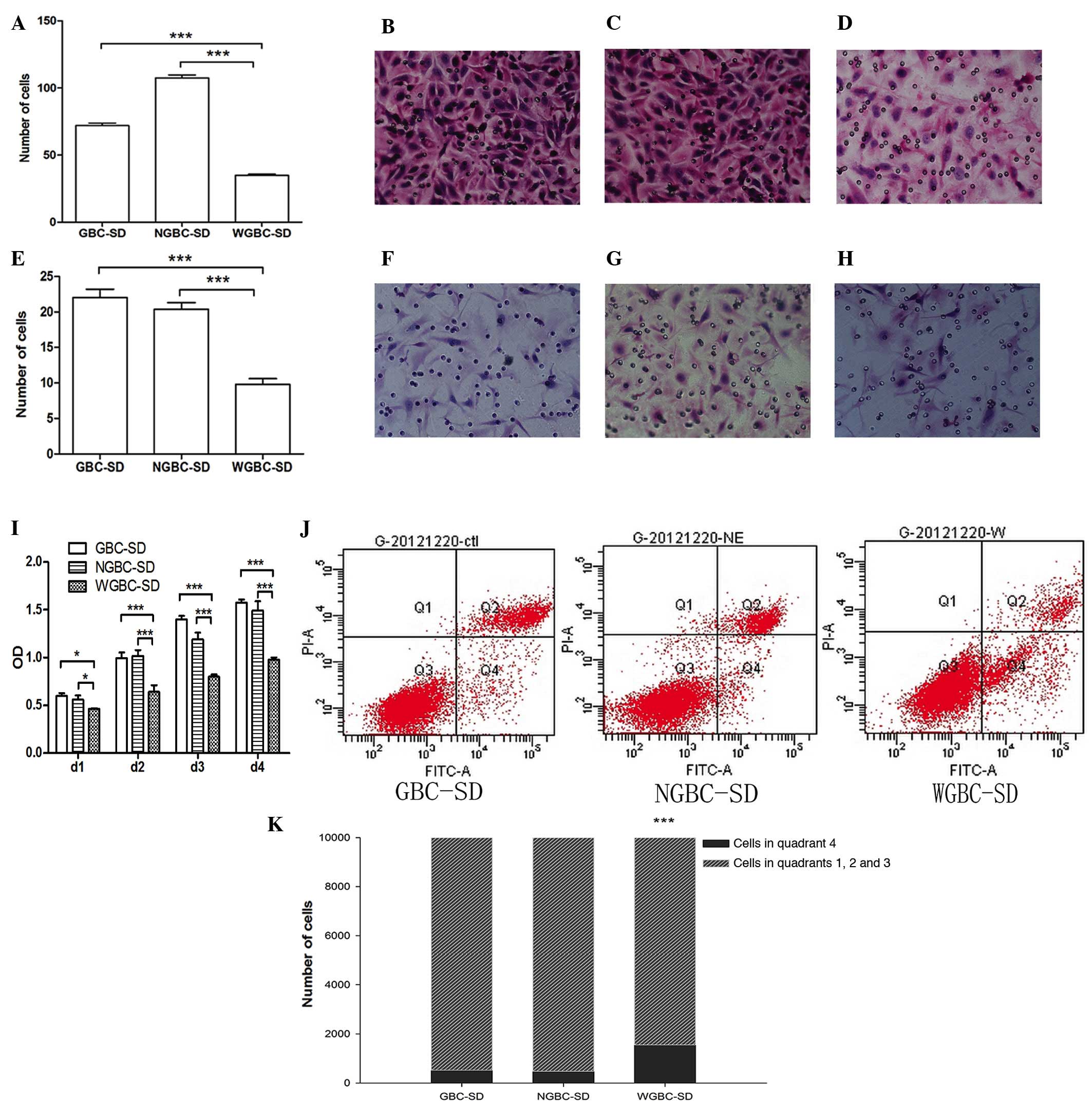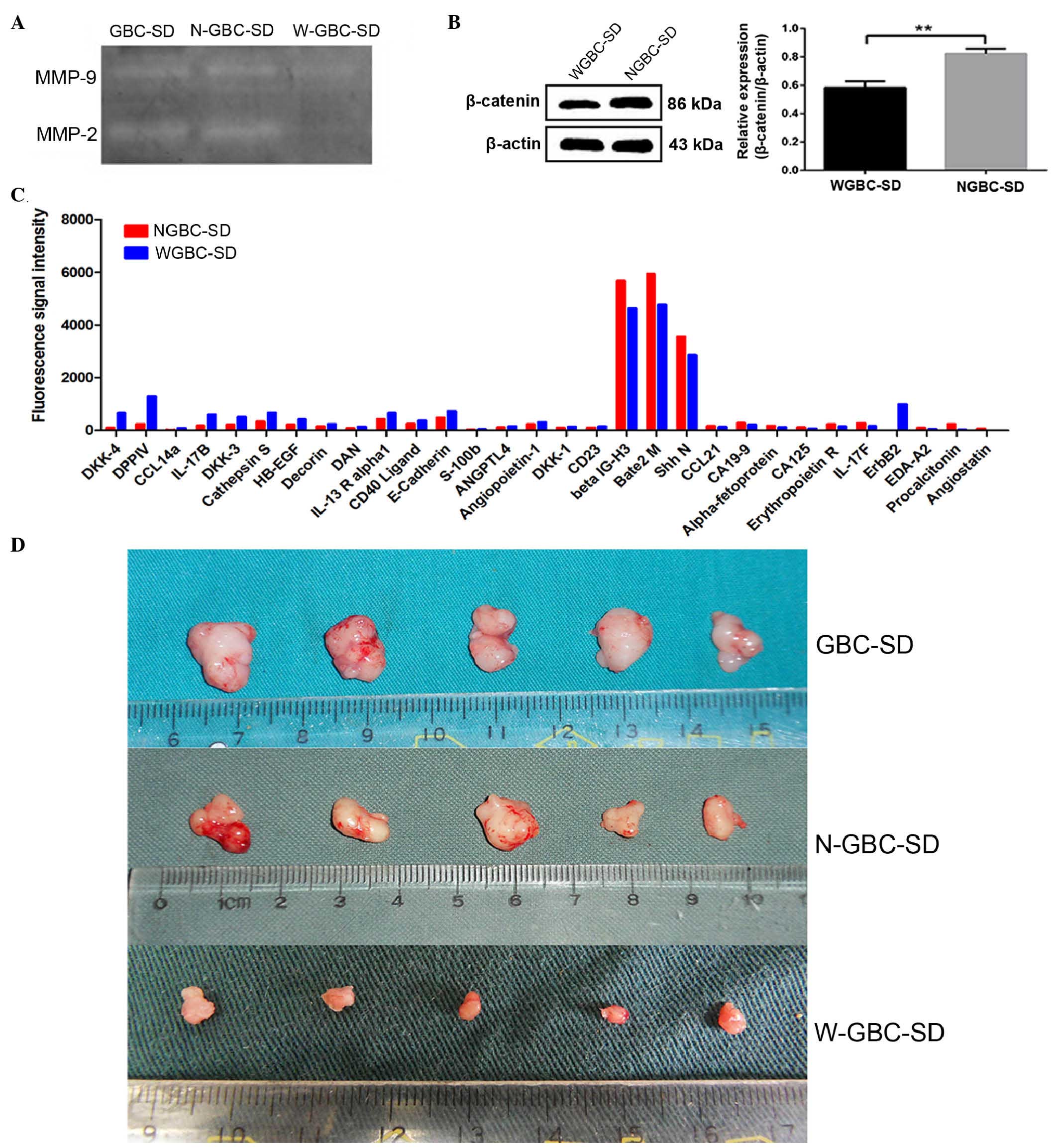|
1
|
Donohue JH, Stewart AK and Menck HR: The
national cancer data base report on carcinoma of the gallbladder,
1989–1995. Cancer. 83:2618–2628. 1998. View Article : Google Scholar
|
|
2
|
Coburn NG, Cleary SP, Tan JC and Law CH:
Surgery for gallbladder cancer: A population-based analysis. J Am
Coll Surg. 207:371–382. 2008. View Article : Google Scholar : PubMed/NCBI
|
|
3
|
Zhu AX, Hong TS, Hezel AF and Kooby DA:
Current management of gallbladder carcinoma. Oncologist.
15:168–181. 2010. View Article : Google Scholar : PubMed/NCBI
|
|
4
|
Nusse R and Varmus HE: Many tumors induced
by the mouse mammary tumor virus contain a provirus integrated in
the same region of the host genome. Cell. 31:99–109. 1982.
View Article : Google Scholar : PubMed/NCBI
|
|
5
|
Wodarz A and Nusse R: Mechanisms of Wnt
signaling in development. Annu Rev Cell Dev Biol. 14:59–88. 1998.
View Article : Google Scholar
|
|
6
|
Clevers H: Wnt/beta-catenin signaling in
development and disease. Cell. 127:469–480. 2006. View Article : Google Scholar : PubMed/NCBI
|
|
7
|
Taketo MM: Wnt signaling and
gastrointestinal tumorigenesis in mouse models. Oncogene.
25:7522–7530. 2006. View Article : Google Scholar : PubMed/NCBI
|
|
8
|
Van Scoyk M, Randall J, Sergew A, Williams
LM, Tennis M and Winn RA: Wnt signaling pathway and lung disease.
Transl Res. 151:175–180. 2008. View Article : Google Scholar : PubMed/NCBI
|
|
9
|
Karamboulas C and Ailles L: Developmental
signaling pathways in cancer stem cells of solid tumors. Biochim
Biophys Acta. 1830:2481–2495. 2013. View Article : Google Scholar
|
|
10
|
Hsieh JC, Kodjabachian L, Rebbert ML,
Rattner A, Smallwood PM, Samos CH, Nusse R, Dawid IB and Nathans J:
A new secreted protein that binds to Wnt proteins and inhibits
their activities. Nature. 398:431–436. 1999. View Article : Google Scholar
|
|
11
|
Liepinsh E, Bányai L, Patthy L and Otting
G: NMR structure of the WIF domain of the human Wnt-inhibitory
factor-1. J Mol Biol. 357:942–950. 2006. View Article : Google Scholar : PubMed/NCBI
|
|
12
|
Kawano Y and Kypta R: Secreted antagonists
of the Wnt signaling pathway. J Cell Sci. 116:2627–2634. 2003.
View Article : Google Scholar : PubMed/NCBI
|
|
13
|
Kim AS, Lowenstein DH and Pleasure SJ: Wnt
receptors and Wnt inhibitors are expressed in gradients in the
developing telencephalon. Mech Dev. 103:167–172. 2001. View Article : Google Scholar : PubMed/NCBI
|
|
14
|
Wissmann C, Wild PJ, Kaiser S, Roepcke S,
Stoehr R, Woenckhaus M, Kristiansen G, Hsieh JC, Hofstaedter F,
Hartmann A, et al: WIF1, a component of the Wnt pathway, is
downregulated in prostate, breast, lung and bladder cancer. J
Pathol. 201:204–212. 2003. View Article : Google Scholar : PubMed/NCBI
|
|
15
|
Licchesi JD, Westra WH, Hooker CM, Machida
EO, Baylin SB and Herman JG: Epigenetic alteration of Wnt pathway
antagonists in progressive glandular neoplasia of the lung.
Carcinogenesis. 29:895–904. 2008. View Article : Google Scholar : PubMed/NCBI
|
|
16
|
Byun T, Karimi M, Marsh JL, Milovanovic T,
Lin F and Holcombe RF: Expression of secreted Wnt antagonists in
gastrointestinal tissues: Potential role in stem cell homeostasis.
J Clin Pathol. 58:515–519. 2005. View Article : Google Scholar : PubMed/NCBI
|
|
17
|
Frommer M, McDonald LE, Millar DS, Collis
CM, Watt F, Grigg GW, Molloy PL and Paul CL: A genomic sequencing
protocol that yields a positive display of 5-methylcytosine
residues in individual DNA strands. Proc Natl Acad Sci USA.
89:1827–1831. 1992. View Article : Google Scholar : PubMed/NCBI
|
|
18
|
Behrens J and Lustig B: The Wnt connection
to tumorigenesis. Int J Dev Biol. 48:477–487. 2004. View Article : Google Scholar : PubMed/NCBI
|
|
19
|
Taniguchi H, Yamamoto H, Hirata T,
Miyamoto N, Oki M, Nosho K, Adachi Y, Endo T, Imai K and Shinomura
Y: Frequent epigenetic inactivation of Wnt inhibitory factor-1 in
human gastrointestinal cancers. Oncogene. 24:7946–7952. 2005.
View Article : Google Scholar : PubMed/NCBI
|
|
20
|
Schroeder M and Mass MJ: CpG methylation
inactivates the transcriptional activity of the promoter of the
human p53 tumor suppressor gene. Biochem Biophys Res Commun.
235:403–406. 1997. View Article : Google Scholar : PubMed/NCBI
|
|
21
|
Holmes R and Soloway PD: Regulation of
imprinted DNA methylation. Cytogenet Genome Res. 113:122–129. 2006.
View Article : Google Scholar : PubMed/NCBI
|
|
22
|
Das PM and Singal R: DNA methylation and
cancer. J Clin Oncol. 22:4632–4642. 2004. View Article : Google Scholar : PubMed/NCBI
|
|
23
|
Batra S, Shi Y, Kuchenbecker KM, He B,
Reguart N, Mikami I, You L, Xu Z, Lin YC, Clément G and Jablons DM:
Wnt inhibitory factor-1, a Wnt antagonist, is silenced by promoter
hypermethylation in malignant pleural mesothelioma. Biochem Biophys
Res Commun. 342:1228–1232. 2006. View Article : Google Scholar : PubMed/NCBI
|
|
24
|
Wang Y, Zhu CS, Bi KH, Xu WW, Dong L and
Hou M: Study of WIF-1 promoter methylation with expressions of
β-catenin in acute leukemia. Zhonghua Yi Xue Za Zhi. 91:2858–2860.
2011.In Chinese.
|
|
25
|
Alvarez C, Tapia T, Cornejo V, Fernandez
W, Muñoz A, Camus M, Alvarez M, Devoto L and Carvallo P: Silencing
of tumor suppressor genes RASSF1A, SLIT2 and WIF1 by promoter
hypermethylation in hereditary breast cancer. Mol Carcinog.
52:475–487. 2013. View
Article : Google Scholar
|
|
26
|
Chan SL, Cui Y, van Hasselt A, Li H,
Srivastava G, Jin H, Ng KM, Wang Y, Lee KY, Tsao GS, et al: The
tumor suppressor Wnt inhibitory factor 1 is frequently methylated
in nasopharyngeal and esophageal carcinomas. Lab Invest.
87:644–650. 2007. View Article : Google Scholar : PubMed/NCBI
|
|
27
|
Palmisano WA, Divine KK, Saccomanno G,
Gilliland FD, Baylin SB, Herman JG and Belinsky SA: Predicting lung
cancer by detecting aberrant promoter methylation in sputum. Cancer
Res. 60:5954–5958. 2000.PubMed/NCBI
|
|
28
|
Belinsky SA, Nikula KJ, Palmisano WA,
Michels R, Saccomanno G, Gabrielson E, Baylin SB and Herman JG:
Aberrant methylation of p16 (INK4a) is an early event in lung
cancer and a potential biomarker for early diagnosis. Proc Natl
Acad Sci USA. 95:11891–11896. 1998. View Article : Google Scholar
|
|
29
|
Bryan J, Kantarjian H, Garcia-Manero G and
Jabbour E: Pharmacokinetic evaluation of decitabine for the
treatment of leukemia. Expert Opin Drug Metab Toxicol. 7:661–672.
2011. View Article : Google Scholar : PubMed/NCBI
|
|
30
|
Gollob JA, Sciambi CJ, Peterson BL,
Richmond T, Thoreson M, Moran K, Dressman HK, Jelinek J and Issa
JP: Phase I trial of sequential low-dose 5-aza-2′-deoxycytidine
plus high-dose intravenous bolus interleukin-2 in patients with
melanoma or renal cell carcinoma. Clin Cancer Res. 12:4619–4627.
2006. View Article : Google Scholar
|
|
31
|
Kawakami K, Hirata H, Yamamura S, Kikuno
N, Saini S, Majid S, Tanaka Y, Kawamoto K, Enokida H, Nakagawa M
and Dahiya R: Functional significance of Wnt inhibitory factor-1
gene in kidney cancer. Cancer Res. 69:8603–8610. 2009. View Article : Google Scholar : PubMed/NCBI
|
|
32
|
Rubin EM, Guo Y, Tu K, Xie J, Zi X and
Hoang BH: Wnt inhibitory factor 1 decreases tumorigenesis and
metastasis in osteosarcoma. Mol Cancer Ther. 9:731–741. 2010.
View Article : Google Scholar : PubMed/NCBI
|
|
33
|
Wu J, Fang J, Yang Z, Chen F, Liu J and
Wang Y: Wnt inhibitory factor-1 regulates glioblastoma cell cycle
and proliferation. J Clin Neurosci. 19:1428–1432. 2012. View Article : Google Scholar : PubMed/NCBI
|
|
34
|
Kaushik SP: Current perspectives in
gallbladder carcinoma. J Gastroenterol Hepatol. 16:848–854. 2001.
View Article : Google Scholar
|
|
35
|
Benaud C, Dickson RB and Thompson EW:
Roles of the matrix metalloproteinases in mammary gland development
and cancer. Breast Cancer Res Treat. 50:97–116. 1998. View Article : Google Scholar : PubMed/NCBI
|
|
36
|
Kim HB, Kim CK, Iijima K, Kobayashi T and
Kita H: Protein microarray analysis in patients with asthma:
Elevation of the chemokine PARC/CCL18 in sputum. Chest.
135:295–302. 2009. View Article : Google Scholar
|
|
37
|
Wu DJ, Qian MJ, Rong RM, Xu M and Zhu TY:
Expression of inflammation cytokines and network analysis in acute
rejection of renal transplantation. Zhonghua Yi Xue Za Zhi.
92:2976–2979. 2012.In Chinese.
|
|
38
|
Enomoto-Iwamoto M, Kitagaki J, Koyama E,
Tamamura Y, Wu C, Kanatani N, Koike T, Okada H, Komori T, Yoneda T,
et al: The Wnt antagonist Frzb-1 regulates chondrocyte maturation
and long bone development during limb skeletogenesis. Dev Biol.
251:142–156. 2002. View Article : Google Scholar : PubMed/NCBI
|
|
39
|
Dun Y, Yang Y, Xiong Z, Feng M, Zhang Y,
Wang M, Xiang J, Li G and Ma R: Induction of Dickkopf-1 contributes
to the neurotoxicity of MPP (+) in PC12 cells via inhibition of the
canonical Wnt signaling pathway. Neuropharmacology. 67:168–175.
2013. View Article : Google Scholar
|
|
40
|
Chen B, Ma X, Liu S, Zhao W and Wu J:
Inhibition of lung cancer cells growth, motility and induction of
apoptosis by Klotho, a novel secreted Wnt antagonist, in a
dose-dependent manner. Cancer Biol Ther. 13:1221–1228. 2012.
View Article : Google Scholar : PubMed/NCBI
|


















